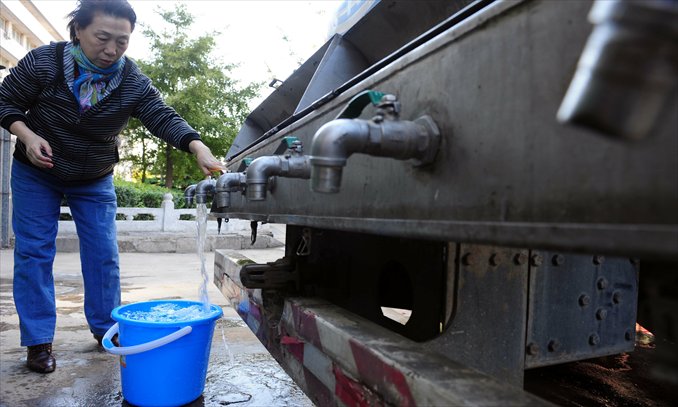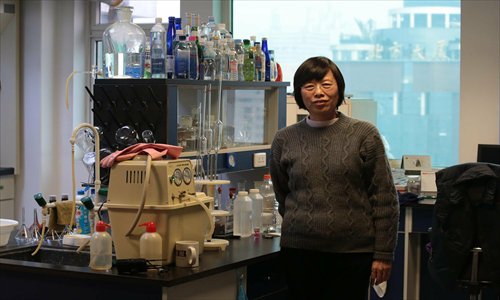Watered down truth


Zhao Feihong, 58, a researcher on drinking water at the Beijing Healthcare Association, says she and her husband, Li Fuxing, also a water expert, have not drunk tap water for 20 years.
"Beijing's water has become more polluted of late," she told the Southern Weekly, "We are probably the most mindful family about healthy drinking water."
After years of researching Beijing's water, the couple has developed the habit of never letting tap water pass their lips and always using bottled water instead.
Zhao's remark soon caused online debate about whether tap water is drinkable. On January 8, Zhao organized an online Q & A session with Internet users. Some 900 questions were asked in 20 minutes. Some blamed the couple for keeping this "secret" to themselves and complained that they couldn't afford bottled water every day, but most expressed their worries about water safety.
Liang Li, a spokesperson from Beijing Waterworks Group, responsible for providing water to the capital, assured the public that "Beijing's tap water meets national water quality standards, it is safe to drink."
In response, Zhao told the Global Times that she agrees Beijing's water is safe to drink but remains unhealthy.
"We never expected such a big reaction from the public," Zhao said. "Not drinking tap water is a personal lifestyle; we are not necessarily encouraging people to follow us."
"Beijing's water is safe to drink, but we believe drinking bottled water is better for you," she continued.
Isabel Hilton, founder and chief editor of the China Dialogue, a bilingual website devoted to the environment, said the couple's ways might seem a little extreme but that it is useful to remind people of the water crisis.
"The problem with our profession is we are quite tied to a short-term crisis and the larger background problems get less attention in the media," Hilton told the Global Times. "I think reminding people of that is very good."
Citizen investigations
However, many people find it confusing to try and pick sides between the personal lifestyle choices of water experts and the guarantees made by authorities. Some have tried a third way to discover the truth.
Beijing resident Hao Yungang did his own experiment. He wrapped his tap in medical gauze for 10 days and posted the result on Weibo. Pictures showed large, dirty yellow stains on the medical gauze.
"This is the most disgusting water I have ever seen, you call this clean?" he wrote.
Hao told the Global Times the couple's remarks had caused widespread concern.
"This is everyone's problem," Hao said. "However, an individual can't fix the problem, the government must take it seriously."
Netizens across the country copied Hao's experiment, with similar results leading to even more complaints.
For Zhu Yi, a professor at China Agricultural University, the problem also lies in the aging network of water pipes.
"A large number of water pipelines throughout the country are aging. There are some contaminated elements inside them, we need to upgrade them," Zhu said.
Concerns about water quality are hardly new. Last year, Dong Liangjie, a specialist on heavy metal pollution in water and former researcher at the University of Hawaii, blogged that water supplies were laced with contraceptive contaminants, likely due to the high rate of contraceptive pill usage in China, not just by humans but also in fisheries and aquaculture. Dong cited an article from the Journal of Environmental Science in February 2012, saying that all 23 samples from six main river systems in China showed significant estrogenic activity, with the highest level in the Yangtze River Delta.
Some Internet users then began to fear that drinking tap water might cause infertility although officials and experts quickly moved to publish evidence refuting Dong's claims. Peng Danhong, the deputy director of gynecology and obstetrics of Zhongda Hospital at Southeast University, told Modern Express that the level of estrogenic compounds in tap water is negligible and would have no effect on the human body.
Trust falls
It has long been known that tap water in China is not drinkable before being boiled, but more and more people choose to eschew this option altogether and rely on mineral water.
In 2008, about 3 billion carboys of water were used. In 2009, sales of drinking water machines topped 11 million, while in 2010, 15 million water filters were bought, according to China Central Television (CCTV).
Expert said the reason behind this is dwindling trust in Chinese society. "We drink tap water because we believe it is safe; just like we believe the police will protect us when we see them. This is basic trust, but it is failing now," said Wang Junxiu, editor of the annual Blue Book on Social Mentality published by the Chinese Academy of Social Sciences earlier this month.
The report shows that overall social trust has declined in 2012, with less than 50 percent of Chinese people believing most people are worthy of trust and between 20 to 30 percent saying they can trust strangers.
"Society has entered a so-called reverse mood, distrust among groups has also worsened, such as the public and officials, civilians and police, patients and doctors…the lack of trust is the reason that caused many social problems," Wang told CCTV.
It is not easy to build trust between public and officials when it comes to transparency. Hundreds of thousands of people from Handan, Hebei Province, never expected to ring in the New Year while drinking and bathing in toxic water for five days.
On December 31, the city's main water resource was reportedly polluted by a ruptured pipe from neighboring Shanxi Province that released nearly 40 tons of aniline, a carcinogenic chemical that can damage human organs if consumed. Nine tons of aniline entered the city's main water source. However, the local officials did not make it public until five days later, according to the Xinhua News Agency.
On January 5, water supplies in Handan, home to 1 million people, were cut off due to pollution, which caused panic buying of all the city's supply of bottled water.
"Some local officials worried that if the public knew the truth, they would run riot," said Wang. "So they kept the truth from the public and lost its trust."
Widespread failures
On January 10, Deng Haihua, spokesman of the Ministry of Health, sought to reassure people that drinking water in Beijing meets the country's official standards.
"I don't know the professional background of these so-called water experts or their motivation in making those comments to the media, but I'm pretty sure that the water quality in Beijing meets all 106 requirements stipulated in the country's latest monitoring standards," Deng said at a press conference.
However, he admitted that the country's drinking water safety faces difficulties such as lack of protection measures and supervision.
According to a survey conducted by Ministry of Environmental Protection in 2011, 11.4 percent of drinking water sources to cities were unsafe, Xinhua reported.
Almost 1,700 water pollution accidents have been reported each year, according to the Ministry of Supervision. Chemical plants built along rivers are causing a spike in environmental damage. Back in 2005, the chemical plant explosions in Jilin province created about 100 tons of pollutants entering the Songhua River. Tens of thousands of residents were evacuated.
In 2011, a mineral water panic buy swept the city of Hangzhou, Zhejiang Province, after 20 tons of carbolic acid were spilled into its river system, knocking out water supplies to 9 million people.
Tap water supplied to millions of people has also regularly failed to pass quality tests. At least 1,000 out of 4,000 water plants failed tests, according to a survey conducted by the Ministry of Housing and Urban-Rural Development in 2009, the Century Weekly magazine reported.
About 300 million people in rural China drink unsafe water contaminated by chemicals, according to an official research on water safety in 2007.
Beginning in July 2012, China's new drinking water standards took effect. Differing from the old version that was approved in 1985, the new one brought about 106 new quality indicators.
In response to the latest credibility crisis, the Beijing Waterworks Group launched an online monitoring system for the real-time quality supervision of the city's water supply. Starting Tuesday, people can log on to the group's website and check data that is set to be updated every three months.
To get a bigger picture of Beijing water's crisis, Green Earth, one of China's oldest environmental NGOs, launched a weekly River Watch activity two years ago to provide Beijing residents with a chance to see the polluted rivers with their own eyes.
As volunteers, the couple Zhao and Li have visited almost all the 100 rivers in Beijing. Zhao said she has witnessed changes in water quality going from clean to cloudy.
"The water quality in Beijing has been deteriorating from dying to dead," Zhou Chen, one of the River Watch organizers, told the Global Times, after four years of watching and recording water quality. He said many people in Beijing might feel disconnected from environmental problems. He believes that is why they were so shocked at finding out the water expert couple's "secret."
"As an environmentalist, I don't suggest people follow Zhao's lifestyle because the disposal of plastic bottles of mineral water can worsen pollution. But I hope more people can go out, see the pollution and talk about it. Hopefully, this would bring about some positive changes in China," Zhou said.